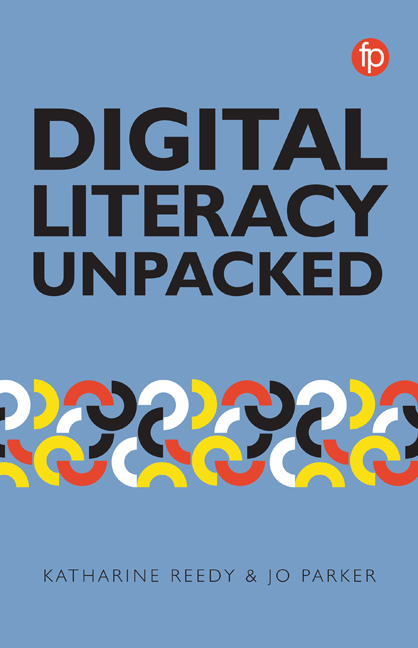Book contents
- Frontmatter
- Contents
- List of figures and case studies
- Foreword
- Notes on Contributors
- Introduction
- Part I Approaching Digital Literacy
- 1 The Trouble With Terminology: Rehabilitating and Rethinking ‘Digital Literacy’
- 2 Unpacking Digital Literacy: the Potential Contribution of Central Services to Enabling the Development of Staff and Student Digital Literacies
- 3 Collaboration and Coaching: Powerful Strategies for Developing Digital Capabilities
- Part II Learning in a Digital World
- Part III Developing Staff Digital Literacies
- Part IV Digital Citizens and Workers
- Conclusion
- Index
1 - The Trouble With Terminology: Rehabilitating and Rethinking ‘Digital Literacy’
from Part I - Approaching Digital Literacy
Published online by Cambridge University Press: 24 September 2019
- Frontmatter
- Contents
- List of figures and case studies
- Foreword
- Notes on Contributors
- Introduction
- Part I Approaching Digital Literacy
- 1 The Trouble With Terminology: Rehabilitating and Rethinking ‘Digital Literacy’
- 2 Unpacking Digital Literacy: the Potential Contribution of Central Services to Enabling the Development of Staff and Student Digital Literacies
- 3 Collaboration and Coaching: Powerful Strategies for Developing Digital Capabilities
- Part II Learning in a Digital World
- Part III Developing Staff Digital Literacies
- Part IV Digital Citizens and Workers
- Conclusion
- Index
Summary
Introduction
This chapter is based on a paper given at the Society for Research in Higher Education Conference in December 2015, which formed part of a symposium on digital literacy (Bennett et al., 2015). Building on discussions at the symposium and the author's experience occupying several different professional identities (librarian, learning technologist, educational developer, teacher and researcher) this chapter reflects on how terminology around digital and information literacies can cause misunderstandings and divisions between those working in higher education. The focus of this chapter is on student learning in higher education, although it draws on the author's experiences of working with staff as well. This is partly in recognition that in order to support students effectively, it is important for academic and professional services staff to have a nuanced understanding of the terminology in the digital and information literacy fields. Staff also need an awareness of their own knowledge, skills and behaviour when using digital technologies and information in its broadest sense. The chapter provides some practical steps that can be taken to bridge the gaps or overlaps in student support within an institution, it discusses how to overcome the misunderstandings that might arise between professional services and academic staff, and finally suggests ways to build a more holistic approach to supporting student learning in higher education.
The term ‘digital literacy’ has gained relatively widespread recognition in a short space of time in UK higher education. The chapter will examine why, when there are many other learning literacies, digital literacy seems to have particular resonance and currency. I will also examine the problems that this might cause and why ‘digital’ is in many ways a distraction for teachers, who really need to focus on developing students’ and their own critical abilities to handle information in all its guises effectively. Digital literacy has gained widespread attention: however, this chapter will explore why it is a problematic and ill-defined term. It is also sometimes referred to – interchangeably – as digital capabilities, which is the term used by Jisc to describe the six capabilities that staff in post-16 education need for themselves and their learners (Jisc, 2017). It is also used by the Universities and Colleges Information Systems Association (UCISA), which has undertaken a Digital Capabilities Survey across higher education staff since 2014 (UCISA, 2017).
- Type
- Chapter
- Information
- Digital Literacy Unpacked , pp. 3 - 16Publisher: FacetPrint publication year: 2018
- 3
- Cited by



